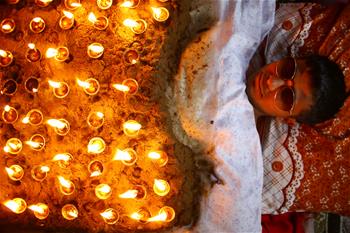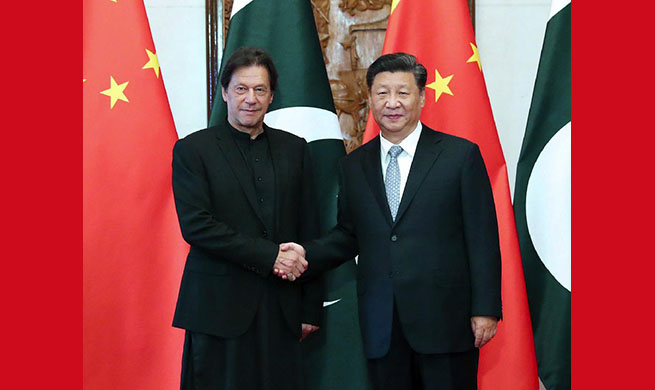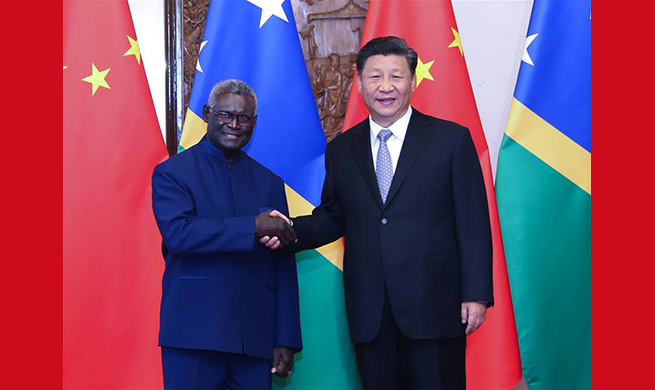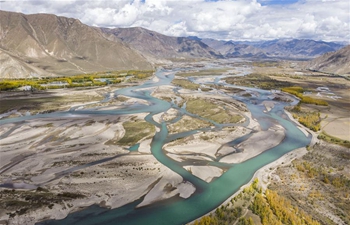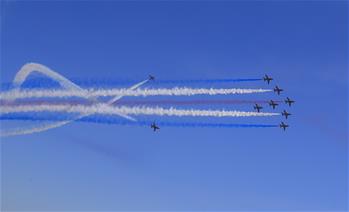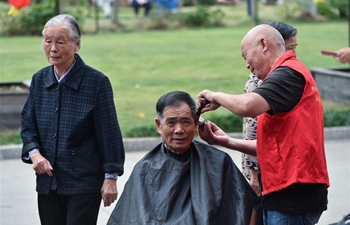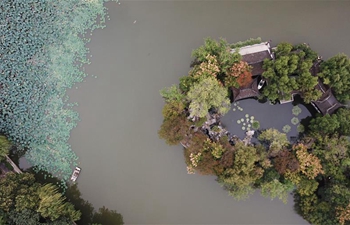ANKARA, Oct. 9 (Xinhua) -- As Turkey is getting ready to intervene militarily in northeastern Syria amid conflicting signals given by the United States, thousands of captured Islamic State (IS) fighters in the region posed many uncertainties and may prove challenging for Ankara.
On Sunday, when announcing the withdrawal of the U.S. troops from northern Syria which was widely considered as "giving a green light" to a long-awaited Turkish incursion there, U.S. President Donald Trump touched upon a hot potato.
He insisted that NATO partner Turkey must assume responsibility for the IS fighters, who are detained currently in overcrowded makeshift prisons by the Syrian Democratic Forces (SDF) which wiped them from Syria with the help of the coalition forces.
But the problem is the target of a Turkish operation will be the U.S.-supported Kurdish fighters of the People's Protection Units (YPG) who constitute the backbone of the SDF and control northeastern Syria.
The Turkish government considers them as "terrorists" and vowed to clean them from its borders.
The situation is complicated because the YPG forces manage the prisons where thousands of former armed jihadists are held without any solution to the problem.
Politicians and soldiers from the Syrian region have long called for Western help in dealing with the prisoners locally, including setting up a recognized war crimes tribunal, amid warnings that the IS could otherwise rerise.
But Trump wants to wash his hands from this messy problem as he said on Twitter that it was time to pull out from Syria. "Turkey, Europe, Syria, Iran, Iraq, Russia and the Kurds will now have to figure the situation out," he said, adding "what they want to do with the captured IS fighters in their neighborhood."
Estimates of the number of IS fighters in detention vary. Some reports say there are some 10,000 fighters, mostly consisting of Syrians and Iraqis. Around 2,000 of them are foreigners coming from 50 different nations who mostly entered Syria illegally from Turkey before 2015.
However, Turkish President Recep Tayyip Erdogan said on Monday that those figures are "exaggerated."
"The number of Daesh (IS) prisoners has been a bit exaggerated," he told reporters.
"The United States is working to decide how to handle them," although the Americans have not been directly responsible for incarcerating nor operating the facilities where they are kept, added the Turkish leader.
There are also reportedly around 70,000 people who are wives and children of the fighters in the notorious al-Hawl camp, adding to the complexity of the situation.
European nations who have dozens of their nationals in those camps have been very reluctant to repatriate them. Britain even went so far to deprive them of their nationalities to prevent their return.
Experts are dubious on how Turkey would manage such a messy problem while trying to fight the YPG and also establish a planned safe zone east of the Euphrates river to deliver its ambitious plans of repatriating a sizable portion of the 3.6 millions Syrian refugees that it currently hosts.
"It is an absolute mystery whether Turkey has the will or the capacity to take charge of these imprisoned IS terrorists," Tulin Daloglu, an expert on Turkish-U.S. relations, told Xinhua.
"There are millions of Syrians that Turkey is actually hosting and now it seems we have to deal with a large community of IS fighters and their families in Syria, thus this is raising important questions," said former ambassador and political commentator Oguz Demiralp.
"I hope that the Turkish government has defined a clear strategy how to handle these people which could become a burden in case of a Turkish offensive," he added.
Daloglu also warned of the implications that such a dangerous undertaking could have on jihadist cells in Turkey which have killed dozens of people in bombing attacks in big cities in 2016 before a massive police crackdown.
"More challenging is that there are countless sleeping cells inside Turkey that Turkey's security has in a way been hijacked by the network of these illegal groups," argued Daloglu.
There is also the danger that these fighters could escape during fights between the Turkish army and the YPG and even the dreadful scenario that they could be set free and armed by frustrated Kurdish militants in order to join the fight.
Another worst scenario regularly put forward by international analysts is the possibility of a re-emergence of IS in Syria if the SDF and the YPG are eradicated in northeastern Syria.
But the Turkish government has argued that the situation will never happen, referring to its two previous incursions which has made possible the peaceful return of nearly 40,000 Syrians to their homes.







